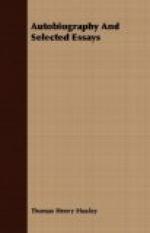But suddenly the long wait, the faith in self, were justified, and the turning point came. “There is always a Cape Horn in one’s life that one either weathers or wrecks one’s self on,” he writes to his sister. “Thank God, I think I may say I have weathered mine—not without a good deal of damage to spars and rigging though, for it blew deuced hard on the other side.” In 1854 a permanent lectureship was offered him at the Government School of Mines; also, a lectureship at St. Thomas’ Hospital; and he was asked to give various other lecture courses. He thus found himself able to establish the home for which he had waited eight years. In July, 1855, he was married to Miss Heathorn.
The succeeding years from 1855 to 1860 were filled with various kinds of work connected with science: original investigation, printing of monographs, and establishing of natural history museums. His advice concerning local museums is interesting and characteristically expressed. “It [the local museum if properly arranged] will tell both natives and strangers exactly what they want to know, and possess great scientific interest and importance. Whereas the ordinary lumber-room of clubs from New Zealand, Hindu idols, sharks’ teeth, mangy monkeys, scorpions, and conch shells—who shall describe the weary inutility of it? It is really worse than nothing, because it leads the unwary to look for objects of science elsewhere than under their noses. What they want to know is that their ‘America is here,’ as Wilhelm Meister has it.” During this period, also, he began his lectures to workingmen, calling them Peoples’ Lectures. “Popular lectures,” he said, “I hold to be an abomination unto the Lord.” Working-men attended these lectures in great numbers, and to them Huxley seemed to be always able to speak at his best. His purpose in giving these lectures should be expressed in his own words: “I want the working class to understand that Science and her ways are great facts for them—that physical virtue is the base of all other, and that they are to be clean and temperate and all the rest—not because fellows in black and white ties tell them so, but because there are plain and patent laws which they must obey ‘under penalties.’”




